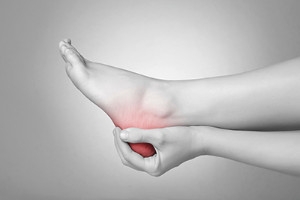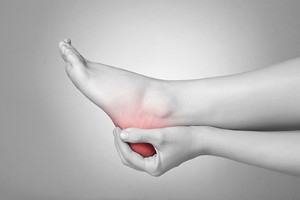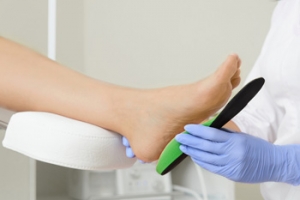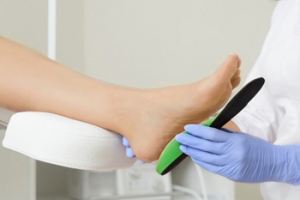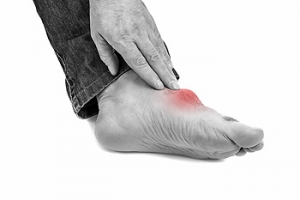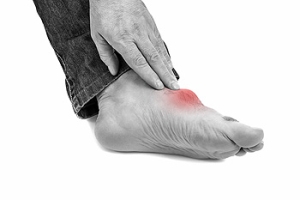Items filtered by date: December 2020
What Causes Burning Pain in the Heel?
A burning sensation in the heel can be a troubling symptom. Burning pain in the heel or bottom of the foot that has a tingling or prickling quality, causes numbness, feels hot, and is worse at night may be indicative of nerve damage or a disorder affecting the nerves that supply the foot. There are many conditions that can cause this type of damage, including diabetic neuropathy, physical trauma or injuries, tarsal tunnel syndrome, autoimmune diseases, and certain infections. If you have burning heel pain, it is suggested that you visit a podiatrist. A podiatrist can help diagnose the cause of your pain and find the right treatment for you.
Many people suffer from bouts of heel pain. For more information, contact Dr. Kenneth Donovan of Advanced Care Foot and Ankle. Our doctor can provide the care you need to keep you pain-free and on your feet.
Causes of Heel Pain
Heel pain is often associated with plantar fasciitis. The plantar fascia is a band of tissues that extends along the bottom of the foot. A rip or tear in this ligament can cause inflammation of the tissue.
Achilles tendonitis is another cause of heel pain. Inflammation of the Achilles tendon will cause pain from fractures and muscle tearing. Lack of flexibility is also another symptom.
Heel spurs are another cause of pain. When the tissues of the plantar fascia undergo a great deal of stress, it can lead to ligament separation from the heel bone, causing heel spurs.
Why Might Heel Pain Occur?
- Wearing ill-fitting shoes
- Wearing non-supportive shoes
- Weight change
- Excessive running
Treatments
Heel pain should be treated as soon as possible for immediate results. Keeping your feet in a stress-free environment will help. If you suffer from Achilles tendonitis or plantar fasciitis, applying ice will reduce the swelling. Stretching before an exercise like running will help the muscles. Using all these tips will help make heel pain a condition of the past.
If you have any questions please contact one of our offices located in Warren, Livingston, and Toms River, NJ.
We offer the newest diagnostic and treatment technologies for all your foot and ankle needs.
What Causes Burning Pain in the Heel?
A burning sensation in the heel can be a troubling symptom. Burning pain in the heel or bottom of the foot that has a tingling or prickling quality, causes numbness, feels hot, and is worse at night may be indicative of nerve damage or a disorder affecting the nerves that supply the foot. There are many conditions that can cause this type of damage, including diabetic neuropathy, physical trauma or injuries, tarsal tunnel syndrome, autoimmune diseases, and certain infections. If you have burning heel pain, it is suggested that you visit a podiatrist. A podiatrist can help diagnose the cause of your pain and find the right treatment for you.
Many people suffer from bouts of heel pain. For more information, contact Dr. Kenneth Donovan of Advanced Care Foot and Ankle. Our doctor can provide the care you need to keep you pain-free and on your feet.
Causes of Heel Pain
Heel pain is often associated with plantar fasciitis. The plantar fascia is a band of tissues that extends along the bottom of the foot. A rip or tear in this ligament can cause inflammation of the tissue.
Achilles tendonitis is another cause of heel pain. Inflammation of the Achilles tendon will cause pain from fractures and muscle tearing. Lack of flexibility is also another symptom.
Heel spurs are another cause of pain. When the tissues of the plantar fascia undergo a great deal of stress, it can lead to ligament separation from the heel bone, causing heel spurs.
Why Might Heel Pain Occur?
- Wearing ill-fitting shoes
- Wearing non-supportive shoes
- Weight change
- Excessive running
Treatments
Heel pain should be treated as soon as possible for immediate results. Keeping your feet in a stress-free environment will help. If you suffer from Achilles tendonitis or plantar fasciitis, applying ice will reduce the swelling. Stretching before an exercise like running will help the muscles. Using all these tips will help make heel pain a condition of the past.
If you have any questions please contact one of our offices located in Warren, Livingston, and Toms River, NJ . We offer the newest diagnostic and treatment technologies for all your foot and ankle needs.
Foot Conditions That May Benefit From Orthotics
Living with daily foot pain can disrupt the quality of your life. It may cause difficulty completing daily activities.
If you are having discomfort in your feet and would like to try orthotics, contact Dr. Kenneth Donovan from Advanced Care Foot and Ankle. Our doctor can provide the care you need to keep you pain-free and on your feet.
What Are Orthotics?
Orthotics are inserts you can place into your shoes to help with a variety of foot problems such as flat feet or foot pain. Orthotics provide relief and comfort for minor foot and heel pain but can’t correct serious biomechanical problems in your feet.
Over-the-Counter Inserts
Orthotics come in a wide variety of over-the-counter inserts that are used to treat foot pain, heel pain, and minor problems. For example, arch supports can be inserted into your shoes to help correct overarched or flat feet, while gel insoles are often used because they provide comfort and relief from foot and heel pain by alleviating pressure.
Prescription Orthotics
If over-the-counter inserts don’t work for you or if you have a more severe foot concern, it is possible to have your podiatrist prescribe custom orthotics. These high-quality inserts are designed to treat problems such as abnormal motion, plantar fasciitis, and severe forms of heel pain. They can even be used to help patients suffering from diabetes by treating foot ulcers and painful calluses and are usually molded to your feet individually, which allows them to provide full support and comfort.
If you are experiencing minor to severe foot or heel pain, it’s recommended to speak with your podiatrist about the possibilities of using orthotics. A podiatrist can determine which type of orthotic is right for you and allow you to take the first steps towards being pain-free.
If you have any questions please contact one of our offices located in Warren, Livingston, and Toms River, NJ . We offer the newest diagnostic and treatment technologies for all your foot and ankle needs.
Foot Conditions That May Benefit From Orthotics
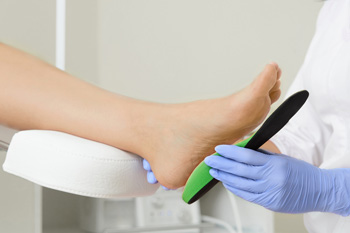 Living with daily foot pain can disrupt the quality of your life. It may cause difficulty completing daily activities. Simple things like walking and standing may become overwhelming. Many patients who are afflicted with foot pain are prescribed orthotics. Orthotics are custom made inserts that fit inside of the shoe. They are known to relieve pressure by redistributing the body’s weight, and may help in making everyday tasks more manageable. Some of the ailments orthotics can be used for include bunions, rheumatoid arthritis, and heel or arch pain, which may be caused by plantar fasciitis. If you have any type of foot pain, it is strongly recommended that you consult with a podiatrist who can determine if orthotics are right for you.
Living with daily foot pain can disrupt the quality of your life. It may cause difficulty completing daily activities. Simple things like walking and standing may become overwhelming. Many patients who are afflicted with foot pain are prescribed orthotics. Orthotics are custom made inserts that fit inside of the shoe. They are known to relieve pressure by redistributing the body’s weight, and may help in making everyday tasks more manageable. Some of the ailments orthotics can be used for include bunions, rheumatoid arthritis, and heel or arch pain, which may be caused by plantar fasciitis. If you have any type of foot pain, it is strongly recommended that you consult with a podiatrist who can determine if orthotics are right for you.
If you are having discomfort in your feet and would like to try orthotics, contact Dr. Kenneth Donovan from Advanced Care Foot and Ankle. Our doctor can provide the care you need to keep you pain-free and on your feet.
What Are Orthotics?
Orthotics are inserts you can place into your shoes to help with a variety of foot problems such as flat feet or foot pain. Orthotics provide relief and comfort for minor foot and heel pain but can’t correct serious biomechanical problems in your feet.
Over-the-Counter Inserts
Orthotics come in a wide variety of over-the-counter inserts that are used to treat foot pain, heel pain, and minor problems. For example, arch supports can be inserted into your shoes to help correct overarched or flat feet, while gel insoles are often used because they provide comfort and relief from foot and heel pain by alleviating pressure.
Prescription Orthotics
If over-the-counter inserts don’t work for you or if you have a more severe foot concern, it is possible to have your podiatrist prescribe custom orthotics. These high-quality inserts are designed to treat problems such as abnormal motion, plantar fasciitis, and severe forms of heel pain. They can even be used to help patients suffering from diabetes by treating foot ulcers and painful calluses and are usually molded to your feet individually, which allows them to provide full support and comfort.
If you are experiencing minor to severe foot or heel pain, it’s recommended to speak with your podiatrist about the possibilities of using orthotics. A podiatrist can determine which type of orthotic is right for you and allow you to take the first steps towards being pain-free.
If you have any questions please contact one of our offices located in Warren, Livingston, and Toms River, NJ . We offer the newest diagnostic and treatment technologies for all your foot and ankle needs.
Care In The Comfort Of Your Home With Telehealth
We are pleased to announce that we offer telehealth to patients. For more information, please contact our office.
Care In The Comfort Of Your Home With Telehealth
Sever’s Disease and Heel Pain in Children
Sever’s disease is a common issue that leads to heel pain in children between the ages of 8 and 14. Sever’s disease occurs when the bones in the calves grow faster than the Achilles tendon, which connects the heel bone to the calf muscle. This causes the tendon to tighten and the heel to become swollen and sore. Sever’s disease symptoms are typically most prominent during running or jumping activities. However, there is usually no long term damage caused by Sever’s disease as the child continues to grow. Common symptoms include limping, tenderness in the heel, especially after exercise, and swelling in the heel bone. If you believe that your child is struggling with Sever’s disease, consulting with a podiatrist is suggested.
Sever's disease often occurs in children and teens. If your child is experiencing foot or ankle pain, see Dr. Kenneth Donovan from Advanced Care Foot and Ankle. Our doctor can treat your child’s foot and ankle needs.
Sever’s Disease
Sever’s disease is also known as calcaneal apophysitis, which is a medical condition that causes heel pain I none or both feet. The disease is known to affect children between the ages of 8 and 14.
Sever’s disease occurs when part of the child’s heel known as the growth plate (calcaneal epiphysis) is attached to the Achilles tendon. This area can suffer injury when the muscles and tendons of the growing foot do not keep pace with bone growth. Therefore, the constant pain which one experiences at the back of the heel will make the child unable to put any weight on the heel. The child is then forced to walk on their toes.
Symptoms
Acute pain – Pain associated with Sever’s disease is usually felt in the heel when the child engages in physical activity such as walking, jumping and or running.
Highly active – Children who are very active are among the most susceptible in experiencing Sever’s disease, because of the stress and tension placed on their feet.
If you have any questions, please feel free to contact one of our offices located in Warren, Livingston, and Toms River, NJ . We offer the newest diagnostic and treatment technologies for all your foot and ankle injuries.
Sever's Disease and Heel Pain in Children
 Sever’s disease is a common issue that leads to heel pain in children between the ages of 8 and 14. Sever’s disease occurs when the bones in the calves grow faster than the Achilles tendon, which connects the heel bone to the calf muscle. This causes the tendon to tighten and the heel to become swollen and sore. Sever’s disease symptoms are typically most prominent during running or jumping activities. However, there is usually no long term damage caused by Sever’s disease as the child continues to grow. Common symptoms include limping, tenderness in the heel, especially after exercise, and swelling in the heel bone. If you believe that your child is struggling with Sever’s disease, consulting with a podiatrist is suggested.
Sever’s disease is a common issue that leads to heel pain in children between the ages of 8 and 14. Sever’s disease occurs when the bones in the calves grow faster than the Achilles tendon, which connects the heel bone to the calf muscle. This causes the tendon to tighten and the heel to become swollen and sore. Sever’s disease symptoms are typically most prominent during running or jumping activities. However, there is usually no long term damage caused by Sever’s disease as the child continues to grow. Common symptoms include limping, tenderness in the heel, especially after exercise, and swelling in the heel bone. If you believe that your child is struggling with Sever’s disease, consulting with a podiatrist is suggested.
Sever's disease often occurs in children and teens. If your child is experiencing foot or ankle pain, see Dr. Kenneth Donovan from Advanced Care Foot and Ankle. Our doctor can treat your child’s foot and ankle needs.
Sever’s Disease
Sever’s disease is also known as calcaneal apophysitis, which is a medical condition that causes heel pain I none or both feet. The disease is known to affect children between the ages of 8 and 14.
Sever’s disease occurs when part of the child’s heel known as the growth plate (calcaneal epiphysis) is attached to the Achilles tendon. This area can suffer injury when the muscles and tendons of the growing foot do not keep pace with bone growth. Therefore, the constant pain which one experiences at the back of the heel will make the child unable to put any weight on the heel. The child is then forced to walk on their toes.
Symptoms
Acute pain – Pain associated with Sever’s disease is usually felt in the heel when the child engages in physical activity such as walking, jumping and or running.
Highly active – Children who are very active are among the most susceptible in experiencing Sever’s disease, because of the stress and tension placed on their feet.
If you have any questions, please feel free to contact one of our offices located in Warren, Livingston, and Toms River, NJ . We offer the newest diagnostic and treatment technologies for all your foot and ankle injuries.
What Can Cause Gout?
Patients who experience gout attacks are aware of the severe and debilitating pain this condition may cause. It is considered to be a form of arthritis and typically affects the joints in the big toe. Some of the symptoms that are generally associated with gout include swelling on or near the affected joints, and it may often feel warm when touched. Gout is caused by an excess of uric acid in the bloodstream, which is referred to as hyperuricemia. It may occur from genetic reasons, or from eating foods that have high levels of purines. These can consist of red meat, shellfish, and drinks that have an elevated sugar content. Additionally, existing medical conditions such as diabetes, high blood pressure, and poor kidney function, may play significant roles in developing gout. If you are afflicted with this type of arthritis, it is strongly suggested that you are under the care of a podiatrist who can effectively treat this condition.
Gout is a foot condition that requires certain treatment and care. If you are seeking treatment, contact Dr. Kenneth Donovan from Advanced Care Foot and Ankle. Our doctor will treat your foot and ankle needs.
What Is Gout?
Gout is a type of arthritis caused by a buildup of uric acid in the bloodstream. It often develops in the foot, especially the big toe area, although it can manifest in other parts of the body as well. Gout can make walking and standing very painful and is especially common in diabetics and the obese.
People typically get gout because of a poor diet. Genetic predisposition is also a factor. The children of parents who have had gout frequently have a chance of developing it themselves.
Gout can easily be identified by redness and inflammation of the big toe and the surrounding areas of the foot. Other symptoms include extreme fatigue, joint pain, and running high fevers. Sometimes corticosteroid drugs can be prescribed to treat gout, but the best way to combat this disease is to get more exercise and eat a better diet.
If you have any questions please feel free to contact one of our offices located in Warren, Livingston, and Toms River, NJ . We offer the newest diagnostic and treatment technologies for all your foot and ankle needs.
What Can Cause Gout?
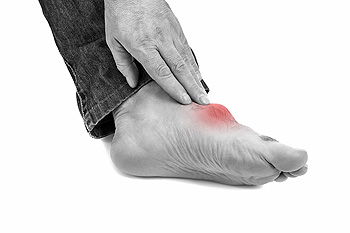 Patients who experience gout attacks are aware of the severe and debilitating pain this condition may cause. It is considered to be a form of arthritis and typically affects the joints in the big toe. Some of the symptoms that are generally associated with gout include swelling on or near the affected joints, and it may often feel warm when touched. Gout is caused by an excess of uric acid in the bloodstream, which is referred to as hyperuricemia. It may occur from genetic reasons, or from eating foods that have high levels of purines. These can consist of red meat, shellfish, and drinks that have an elevated sugar content. Additionally, existing medical conditions such as diabetes, high blood pressure, and poor kidney function, may play significant roles in developing gout. If you are afflicted with this type of arthritis, it is strongly suggested that you are under the care of a podiatrist who can effectively treat this condition.
Patients who experience gout attacks are aware of the severe and debilitating pain this condition may cause. It is considered to be a form of arthritis and typically affects the joints in the big toe. Some of the symptoms that are generally associated with gout include swelling on or near the affected joints, and it may often feel warm when touched. Gout is caused by an excess of uric acid in the bloodstream, which is referred to as hyperuricemia. It may occur from genetic reasons, or from eating foods that have high levels of purines. These can consist of red meat, shellfish, and drinks that have an elevated sugar content. Additionally, existing medical conditions such as diabetes, high blood pressure, and poor kidney function, may play significant roles in developing gout. If you are afflicted with this type of arthritis, it is strongly suggested that you are under the care of a podiatrist who can effectively treat this condition.
Gout is a foot condition that requires certain treatment and care. If you are seeking treatment, contact Dr. Kenneth Donovan from Advanced Care Foot and Ankle. Our doctor will treat your foot and ankle needs.
What Is Gout?
Gout is a type of arthritis caused by a buildup of uric acid in the bloodstream. It often develops in the foot, especially the big toe area, although it can manifest in other parts of the body as well. Gout can make walking and standing very painful and is especially common in diabetics and the obese.
People typically get gout because of a poor diet. Genetic predisposition is also a factor. The children of parents who have had gout frequently have a chance of developing it themselves.
Gout can easily be identified by redness and inflammation of the big toe and the surrounding areas of the foot. Other symptoms include extreme fatigue, joint pain, and running high fevers. Sometimes corticosteroid drugs can be prescribed to treat gout, but the best way to combat this disease is to get more exercise and eat a better diet.
If you have any questions please feel free to contact one of our offices located in Warren, Livingston, and Toms River, NJ . We offer the newest diagnostic and treatment technologies for all your foot and ankle needs.
